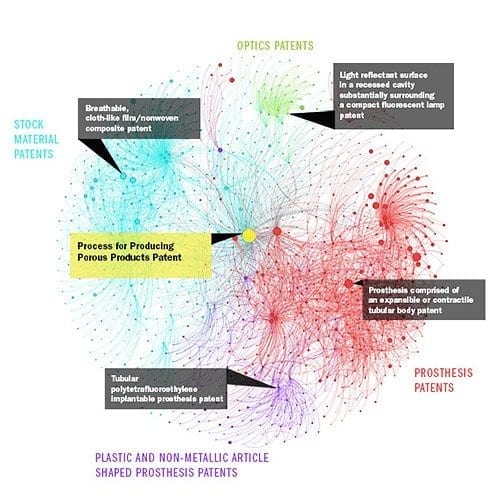
Information storage: A 60-year-old technology offers a solution to a modern problem—how to store all those bits and bytes cheaply and reliably
WHEN physicists switch on the Large Hadron Collider (LHC), between three and six gigabytes of data spew out of it every second. That is, admittedly, an extreme example. But the flow of data from smaller sources than CERN, the European particle-research organisation outside Geneva that runs the LHC, is also growing inexorably. At the moment it is doubling every two years. These data need to be stored. The need for mass storage is reviving a technology which, only a few years ago, seemed destined for the scrapheap: magnetic tape.
Tape is the oldest computer storage medium still in use. It was first put to work on a UNIVAC computer in 1951. But although tape sales have been falling since 2008 and dropped by 14% in 2012, according to the Santa Clara Consulting Group, tape’s decline has now gone into reverse: sales grew by 1% in the last quarter of 2012 and a 3% rise is expected this year.
Alberto Pace, head of data and storage at CERN, says that tape has four advantages over hard disks for the long-term preservation of data. The first is speed. Although it takes about 40 seconds for an archive robot to select the right tape and put it in a reader, once it has loaded, extracting data from that tape is about four times as fast as reading from a hard disk.
The second advantage is reliability. When a tape snaps, it can be spliced back together. The loss is rarely more than a few hundred megabytes—a bagatelle in information-technology circles. When a terabyte hard disk fails, by contrast, all the data on it may be lost. The consequence at CERN, specifically, is that a few hundred megabytes of its 100-petabyte tape repository are, on average, lost every year. Of the 50 petabytes of data held on hard disk, however, it loses a few hundred terabytes in the same period.
The third benefit of tapes is that they do not need power to preserve data held on them. Stopping a disk rotating by temporarily turning off the juice—a process called power cycling—increases the likelihood that it will fail. The fourth benefit is security. If a hacker with a grudge managed to break into CERN’s data centre, he could delete all 50 petabytes of the disk-based data in minutes. To delete the same amount from the organisation’s tapes would take years.
Tape has two other benefits, as Evangelos Eleftheriou, manager of storage technologies at IBM’s research laboratory in Zurich, points out. It is cheaper than disks (a gigabyte of disk storage costs 10 cents, versus 4 cents for tape), and it lasts longer. Tapes can still be read reliably after three decades, against five years for disks.
Tape will never be the whole answer to storing data, according to Dr Eleftheriou. But it forms a crucial part of a “storage hierarchy”.
The Latest on: Information storage
- Panasas Is Now VDURA for AI and HPC Data Storageon May 7, 2024 at 1:12 pm
Long-time HPC data storage company Panasas (formed 1999) is now Vdura. The new brand "signifies the company’s shift to a software company operating under a software subscription-based business model," ...
- Huawei sees future in data storage businesson May 7, 2024 at 8:26 am
Huawei’s president of European enterprise Willi Song and president of IT product line Peter Zhou outlined ambitions for its data storage enterprise.
- Dallas company plans $1.6 billion data center complex near Benbrookon May 7, 2024 at 8:16 am
Fort Worth, not lacking the vast expanses of land needed to house the massive depots, has attempted to position itself as a hub for data storage.
- 3 Storage Devices Stocks to Watch as the Industry Reboundson May 7, 2024 at 8:16 am
The Zacks Computer-Storage Devices industry players are well-poised to gain from solid momentum in cloud computing, Internet of Things (IoT), auto, connected devices, virtual reality and Artificial ...
- TerraMaster D8 4-bay Hybrid NAS storage combines SSD and HDDon May 7, 2024 at 3:50 am
TerraMaster has launched its new D8 Hybrid network attached storage solution in the form of a new hybrid NAS that combines both SSD and HDD ...
- Balancing Virginia’s energy future: A holistic approach to powering data centerson May 7, 2024 at 3:18 am
Virginia, home to the country’s largest concentration of data centers, faces a critical juncture in its energy future. As the demand for data storage and processing grows, so does the need for ...
- Pure Storage exec teases 150TB SSD modules — volume shipments of 75TB SSD modules have only just begunon May 5, 2024 at 8:26 am
All-flash data storage solutions provider Pure Storage has some new 150TB SSD modules in testing. These have been revealed in a teaser timed to coincide with volume shipments of 75TB modules.
- Increase your cloud storage capacity with 500GB from Amaryllo, only $120 for lifeon May 5, 2024 at 1:23 am
Macworld The current generation of digital citizens is learning hard lessons about the perceived and actual freedom of data. For just one example, there’s the cost of cloud storage, which can vary ...
- Save $130 on 500GB of flexible cloud storageon May 5, 2024 at 1:07 am
Take care of your cloud storage needs with a one-time payment. Right now, you can get 500GB of Amaryllo cloud storage for 51% off $249 at just $119.99.
- Hamilton BiOS Automated Storage Systems to Strengthen UK Biobank’s Efforts Towards Improving Human Healthon May 4, 2024 at 6:48 pm
Enhanced and expanded automated sample storage is central to UK Biobank’s new Manchester Science Park facility.United States - May 4, 2024 — ...
via Bing News
The Latest on: Data storage
- Panasas Is Now VDURA for AI and HPC Data Storageon May 7, 2024 at 1:12 pm
Long-time HPC data storage company Panasas (formed 1999) is now Vdura. The new brand "signifies the company’s shift to a software company operating under a software subscription-based business model," ...
- Panasas Rebrands as VDURA: A New Chapter in Software-Defined Storage for AI Applicationson May 7, 2024 at 12:50 pm
VDURA, the AI and HPC data infrastructure software company, today announced its official launch as the new brand identity ...
- Huawei sees future in data storage businesson May 7, 2024 at 8:26 am
Huawei’s president of European enterprise Willi Song and president of IT product line Peter Zhou outlined ambitions for its data storage enterprise.
- Dallas company plans $1.6 billion data center complex near Benbrookon May 7, 2024 at 8:16 am
Fort Worth, not lacking the vast expanses of land needed to house the massive depots, has attempted to position itself as a hub for data storage.
- 3 Storage Devices Stocks to Watch as the Industry Reboundson May 7, 2024 at 8:16 am
The Zacks Computer-Storage Devices industry players are well-poised to gain from solid momentum in cloud computing, Internet of Things (IoT), auto, connected devices, virtual reality and Artificial ...
- Panasas becomes VDURA as it Rewrites the Rules for AI and HPC Data Storageon May 7, 2024 at 5:59 am
VDURA, the AI and HPC data infrastructure software company, today announced its official launch as the new brand identity of Panasas, longtime HPC and parallel file system pioneer. The rebranding ...
- TerraMaster D8 4-bay Hybrid NAS storage combines SSD and HDDon May 7, 2024 at 3:50 am
TerraMaster has launched its new D8 Hybrid network attached storage solution in the form of a new hybrid NAS that combines both SSD and HDD ...
- Balancing Virginia’s energy future: A holistic approach to powering data centerson May 7, 2024 at 3:18 am
Virginia, home to the country’s largest concentration of data centers, faces a critical juncture in its energy future. As the demand for data storage and processing grows, so does the need for ...
- The impact of edge computing on data storage architectureon May 7, 2024 at 12:08 am
E dge computing has come to light as a transformative technology in the scope of data storage architecture, presenting innovative solutions to tackle the challenges caused by the ...
- Pure Storage exec teases 150TB SSD modules — volume shipments of 75TB SSD modules have only just begunon May 5, 2024 at 8:26 am
All-flash data storage solutions provider Pure Storage has some new 150TB SSD modules in testing. These have been revealed in a teaser timed to coincide with volume shipments of 75TB modules.
via Bing News










